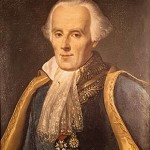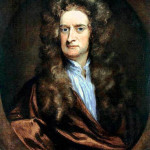 Pierre-Simon Laplace was another really smart guy, by all accounts. He was a physicist, mathematician and astronomer who lived in France from 1749-1827 during some pretty turbulent times: the French Revolution and the Napoleonic Wars. All occurred during his lifetime. He may have even met Ben Franklin or Thomas Jefferson while they were in Paris schmoozing the rich for donations to our own revolution and generally enjoying themselves, although I couldn’t find specific evidence of any meeting. But it’s kind of cool to think they might have hung out!
Pierre-Simon Laplace was another really smart guy, by all accounts. He was a physicist, mathematician and astronomer who lived in France from 1749-1827 during some pretty turbulent times: the French Revolution and the Napoleonic Wars. All occurred during his lifetime. He may have even met Ben Franklin or Thomas Jefferson while they were in Paris schmoozing the rich for donations to our own revolution and generally enjoying themselves, although I couldn’t find specific evidence of any meeting. But it’s kind of cool to think they might have hung out!
Anyhow, Laplace’s social life is not the purpose of this entry; it’s for something he is credited as having said to Napoleon during a presentation on his work of the movement of the various planets in the solar system.
Back up a step or two. Laplace lived almost exactly 100 years after Sir Isaac Newton  (1642-1726 or 7), and followed in Newton’s footsteps. Recall that Newton is widely considered one of the (if not THE) greatest scientist who ever lived, leading the Scientific
(1642-1726 or 7), and followed in Newton’s footsteps. Recall that Newton is widely considered one of the (if not THE) greatest scientist who ever lived, leading the Scientific
Revolution and the birth of the Enlightenment by developing and then refining laws of motion (Newton’s Three Laws of Motion are still taught in basic physics today); calculus, gravitational theory, optics (the understanding that light can be “bent” and split out into all the colors of the rainbow were his initial observations), and on and on. It’s difficult to overstate his contribution to science. Even today, most physicists would say it’s a tossup whether Newton or Einstein have contributed more to the body of science we have today. I would suggest that future scientists will add Stephen Hawking to that debate, but that’s for another entry.
Anyhow, it’s very clear that Laplace had read Newton’s work and was heavily influenced by him; he built on, and defended Newtonian physics. Among many other accomplishments, he developed the mathematics that explained the movement of planets and other heavenly bodies around the sun. The story of Newton and his famous apple is apparently true; he was sitting under a true one sunny summer day when an apple fell to the ground. He began wondering why it went straight to the ground rather than sideways, and from that came up with the gravitational theory (that mass attracts mass, so large bodies like the earth pull smaller bodies like the apple to them). This led to an explanation of the sun as the center of our solar system “holding” all the planets, asteroids and meteors in orbit because of the massive gravitational pull exerted by the sun on each (much) smaller planet.
All this using just his brain. I don’t know about you, but that is absolutely staggering to me. Little wonder that he is still revered in the scientific world (if not the more mundane world of the rest of us!)
A hundred years later, Laplace took Newton’s physics up a notch. He stated that the small irregularities observed in the orbits of the various planets could be explained through mathematics. One of the reasons this is important is that it, prior to Laplace, these irregularities were used as evidence of God. Odd as that may sound today, the belief prior to Laplace was that God needed to step in every so often and bring things back to their proper place in the universe.
So now we go back to Napoleon. He appointed Laplace to the position of Grand Poobah of Science in his government (not really the title, but you get the idea). Laplace was invited to explain his theory of how the planets were kept in their orbits; when he finished Napoleon purportedly asked where was God in this calculation. And Laplace said “I have no need of that hypothesis.” (While there is some debate as to the exact context, it’s pretty universally agreed that something like that happened).
Recall my entry a few back talking about the historical contention that God was involved in the universe in a very personal way, and that things like volcanoes, earthquakes and crop failures were due to God’s wrath; if we pleased God we’d get good crops and no disasters. During The Enlightenment the great thinkers (like Newton and Laplace) realized that there were laws that controlled the universe. If we understood those laws and how they interacted, we could explain how volcanoes and tornadoes happen, as well as things like how and why the planets move the way they do.
Side note: some have used Laplace’s statement as evidence that he was an atheist and was rather arrogantly dismissing God’s place in the universe; in actual fact he was doing nothing of the sort. He was only saying that God’s intervention was not necessary to explain the undeniable observations of the way the universe works; mathematics was fully capable of doing so. He left the existence of God a question that others could debate, but at the very least, His intervention was not required to explain the observed universe.
Full circle to the Enlightenment and the scientific method. The whole point was that, by using our noggins and applying the rules of the universe we can understand (and explain) everything that happens. The tragedy is that we still have people today (Pat Robertson is a classic example) saying a few years back that AIDS is God’s will—He caused people to get AIDS as a punishment for their sins. Or more currently that hurricanes, droughts in California and the like are happening because we’ve somehow displeased God.
Use your heads, people.
About BigBill
Stats: Married male boomer.
Hobbies: Hiking, woodworking, reading, philosophy, good conversation.

“I have no need of that hypothesis”
Anyhow, Laplace’s social life is not the purpose of this entry; it’s for something he is credited as having said to Napoleon during a presentation on his work of the movement of the various planets in the solar system.
Back up a step or two. Laplace lived almost exactly 100 years after Sir Isaac Newton (1642-1726 or 7), and followed in Newton’s footsteps. Recall that Newton is widely considered one of the (if not THE) greatest scientist who ever lived, leading the Scientific
(1642-1726 or 7), and followed in Newton’s footsteps. Recall that Newton is widely considered one of the (if not THE) greatest scientist who ever lived, leading the Scientific
Revolution and the birth of the Enlightenment by developing and then refining laws of motion (Newton’s Three Laws of Motion are still taught in basic physics today); calculus, gravitational theory, optics (the understanding that light can be “bent” and split out into all the colors of the rainbow were his initial observations), and on and on. It’s difficult to overstate his contribution to science. Even today, most physicists would say it’s a tossup whether Newton or Einstein have contributed more to the body of science we have today. I would suggest that future scientists will add Stephen Hawking to that debate, but that’s for another entry.
Anyhow, it’s very clear that Laplace had read Newton’s work and was heavily influenced by him; he built on, and defended Newtonian physics. Among many other accomplishments, he developed the mathematics that explained the movement of planets and other heavenly bodies around the sun. The story of Newton and his famous apple is apparently true; he was sitting under a true one sunny summer day when an apple fell to the ground. He began wondering why it went straight to the ground rather than sideways, and from that came up with the gravitational theory (that mass attracts mass, so large bodies like the earth pull smaller bodies like the apple to them). This led to an explanation of the sun as the center of our solar system “holding” all the planets, asteroids and meteors in orbit because of the massive gravitational pull exerted by the sun on each (much) smaller planet.
All this using just his brain. I don’t know about you, but that is absolutely staggering to me. Little wonder that he is still revered in the scientific world (if not the more mundane world of the rest of us!)
A hundred years later, Laplace took Newton’s physics up a notch. He stated that the small irregularities observed in the orbits of the various planets could be explained through mathematics. One of the reasons this is important is that it, prior to Laplace, these irregularities were used as evidence of God. Odd as that may sound today, the belief prior to Laplace was that God needed to step in every so often and bring things back to their proper place in the universe.
So now we go back to Napoleon. He appointed Laplace to the position of Grand Poobah of Science in his government (not really the title, but you get the idea). Laplace was invited to explain his theory of how the planets were kept in their orbits; when he finished Napoleon purportedly asked where was God in this calculation. And Laplace said “I have no need of that hypothesis.” (While there is some debate as to the exact context, it’s pretty universally agreed that something like that happened).
Recall my entry a few back talking about the historical contention that God was involved in the universe in a very personal way, and that things like volcanoes, earthquakes and crop failures were due to God’s wrath; if we pleased God we’d get good crops and no disasters. During The Enlightenment the great thinkers (like Newton and Laplace) realized that there were laws that controlled the universe. If we understood those laws and how they interacted, we could explain how volcanoes and tornadoes happen, as well as things like how and why the planets move the way they do.
Side note: some have used Laplace’s statement as evidence that he was an atheist and was rather arrogantly dismissing God’s place in the universe; in actual fact he was doing nothing of the sort. He was only saying that God’s intervention was not necessary to explain the undeniable observations of the way the universe works; mathematics was fully capable of doing so. He left the existence of God a question that others could debate, but at the very least, His intervention was not required to explain the observed universe.
Full circle to the Enlightenment and the scientific method. The whole point was that, by using our noggins and applying the rules of the universe we can understand (and explain) everything that happens. The tragedy is that we still have people today (Pat Robertson is a classic example) saying a few years back that AIDS is God’s will—He caused people to get AIDS as a punishment for their sins. Or more currently that hurricanes, droughts in California and the like are happening because we’ve somehow displeased God.
Use your heads, people.
About BigBill
Stats: Married male boomer. Hobbies: Hiking, woodworking, reading, philosophy, good conversation.